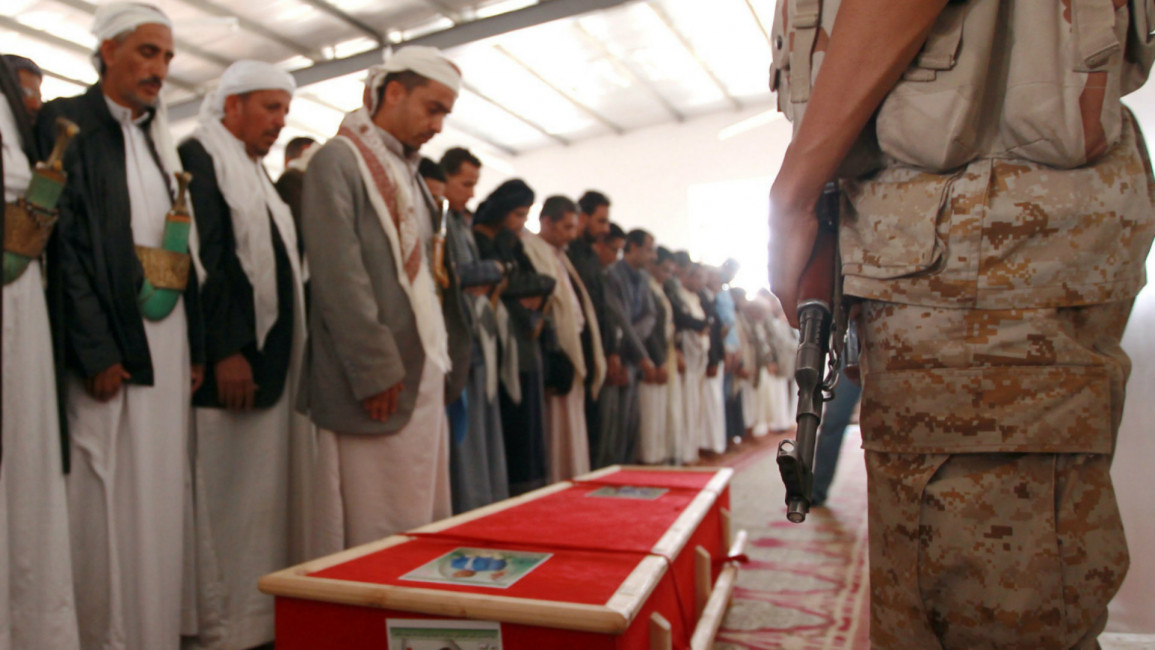UN backs Yemen's Hadi and warns of civil war
Yemen is nearing "the edge of civil war", the UN envoy to the country warned as the Security Council voiced unanimous support for its embattled leader President Abedrabbo Mansour Hadi.
The Houthi advance into Sanaa and further south has forced President Hadi to seek refuge in the main southern city of Aden.
Over the weekend the Houthis seized the airport in a key city en route between the capital Sanaa and the southern coast further threatening Hadi's already tenuous claim to authority.
| Dialogue cannot go on for ever. It's a charade. - Abdulmalik al-Houthi |
The UN Security Council held an emergency session Sunday as unrest mounted, including suicide bombings claimed by the Islamic State group (IS, formerly ISIS) that killed 142 people in Sanaa on Friday.
President Hadi has been a key ally of the United States and cooperated on a military and intelligence level with Washington's campaign against al-Qaeda in the Arabian Peninsula (AQAP), which it considers the most dangerous arm of the global militant network.
The rulers in neighbouring Saudi Arabia are also deeply unsettled by the ascent of the Houthis, viewing them as agents of their regional nemesis, Iran.
The Security Council's 15 members voiced their unanimous support for Hadi, who called in a letter to the council for "urgent intervention by all available means".
"(Recent events) seem to be leading Yemen to the edge of a civil war," UN envoy Jamal Benomar told the meeting on Sunday by video link from Qatar, warning that without immediate action "the country will slide further into further violence and dislocation".
Hadi's plea
In a letter to the council, Hadi said the Houthis and their allies were threatening security in Yemen, the region and beyond.
Hadi has been struggling to reassert his authority and cement his power base in Aden, which he declared the temporary capital after retracting a resignation tendered under Houthi pressure.
The Houthi success in taking Sanaa and key strategic points in the country was enabled not just by the use of brute force but also by capitalising on the failures of the Hadi's government to rein in corruption and live up to the demands of the protests that overthrew the former regime of President Ali Abdullah Saleh.
A statement from the Security Council said it "reaffirms its strong commitment to the unity, sovereignty, independence and territorial integrity of Yemen, and its commitment to stand by the people of Yemen".
The council "supports the legitimacy" of Hadi, it added while denouncing the "unilateral" actions by the Houthis and threatening unspecified measures against the militia unless it cedes control of Sanaa and other regions.
On Sunday, the Houthis and their allies seized the airport in Taez, which is just 180 kilometres (110 miles) north of Aden on the road to Sanaa and seen as a strategic entry point to Hadi's southern refuge.
Security sources said that some 300 men, including Houthi fighters and allied forces, had deployed at the airport and reinforcements were arriving from Sanaa by air and land.
Building alliances
Meanwhile militia leader Abdulmalik al-Houthi urged Yemenis to mobilise and join his militia for an offensive against IS and Al-Qaeda in the south of the impoverished country.
"Al-Qaeda and Daesh must not be allowed to find refuge in any region" in Yemen, he said, using the Arabic acronym for the Islamic State group, which claimed responsibility for Friday's bombings of Houthi mosques.
Speaking on television, he also dismissed Hadi as "a puppet in the hands of forces of evil, led by the United States", which he accuses of plotting against Yemen with funds from Saudi Arabia and Qatar.
Washington announced Saturday it was evacuating its remaining personnel, underlining fears in the West of growing instability.
Houthi also threatened to withdraw from UN-brokered dialogue between Yemen's many rival groups, implicitly rejecting a Saudi offer to host talks.
"Dialogue cannot go on for ever. It's a charade," he said.
The forces allied with the Houthis include members of the former central security force, a unit seen as loyal to ex-president Ali Abdullah Saleh.
Saleh was forced from power in early 2012 after a year-long popular uprising and has been accused of working with the Houthis to restore his influence.
Security sources said Houthi militiamen were also patrolling parts of Taez and had set up checkpoints some 80 kilometres south of the city on the road to Aden.
A military source said troops loyal to Hadi and southern paramilitary forces had deployed in Lahj province north of Aden, in anticipation of a possible Houthi advance.
Houthi militiamen killed one protester in Taez when they fired on thousands of people demanding that the rebels withdraw, activists said.
With extra reporting by al-Araby al-Jadeed staff and agencies.



